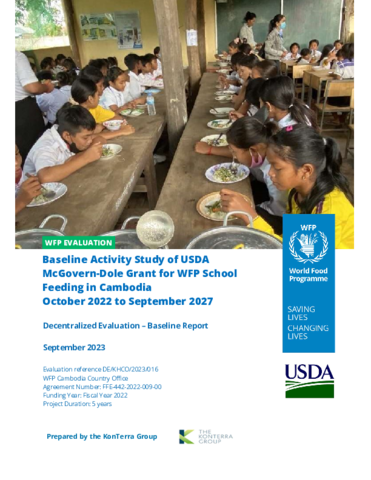
This decentralized evaluation was commissioned by the WFP Cambodia Country Office (CO) as the Baseline Activity Study of USDA McGovern-Dole Grant for WFP School Feeding in Cambodia and covers the education and child nutrition from 2022 to 2027. The evaluation was carried out in 2023.
The purpose of this evaluation is to establish the initial situation at the start of the project, particularly the baseline values for all performance indicators. The midterm and endline evaluations will assess the results achieved based on successive measurement of the same performance indicators. It was intended for both accountability and learning purposes. It focused on assessing the relevance, coherence, effectiveness, and efficiency.
Overarching general questions were:
- What is the pre-cycle (FY22-27) situation for all relevant evaluation criteria (relevance, effectiveness, sustainability, efficiency and coherence), and in terms of Gender Equality and Women’s Empowerment (GEWE) mainstreaming in the project?
- What are the contextual changes that occurred since the FY19 baseline relevant to the programme and under each evaluation criteria, including regarding GEWE aspects?
- Are the project indicators and targets appropriate in effectively measuring and tracking project results for men, women, girls, boys and vulnerable groups based on the results framework?
- To what extent are the midterm and endline evaluation questions relevant in assessing the success of the programme under each criterion and for all categories of participants including men, women, girls, boys and vulnerable groups?
Key baseline study findings included:
- Overall, the project is highly relevant to the objectives of achieving full handover to the Government and coherent with the National Social Protection Policy Framework, National Home-Grown School Feeding Programme (NHGSFP) and the National Early Grade Reading programme. However, one concern is procurement of local food commodities for the HGSF model and WFP is expected to mobilize additional resources, which presents a threat to the handover objectives.
- The FY22 baseline level of 20.4 percent highlights the low levels of early grade literacy and the need to continue to improve this critical outcome. Additional endeavours are essential to ensure data comparability due to varying implementations of the literacy package. The baseline showed a higher proportion of hungry students during class and a lower attendance than in 2020. The Diet Diversity Score calculated at baseline is already higher than the project life target.
- The greatest external factor to affect the FY19 project was the COVID-19 pandemic that resulted 20 months of school closure. Ongoing Decentralization and De-concentration reforms in Cambodia are planned to be rolled out in 2024 and could potentially modify key structures and processes related to the management of the school feeding programme (SFP).
- The overall set of indicators is found appropriate to measure project outputs and outcomes, and realistic considering the achievements of the previous FY19 round. There are some overlapping of indicators, and targets are often not documented, justified and disaggregated by gender. Difficulties such as lack of connectivity, lack of skills in digitalized system, and excessive workloads, were observed. In April 2022, WFP carried out an assessment of the Monitoring and Evaluation System for the NHGSF programme based on a desk review, and clear recommendations and action points were proposed.
- Overall, the evaluation questions capture well the key focus on success and performance of the project, and on the readiness and sustainability of the NHGSF programme. There is a need to streamline the questions by reducing its number, simplifying, and enhancing clarity. It's crucial to integrate of GEWE by incorporating explicit references wherever relevant.
Key conclusions and lessons learnt from the study were:
- The project since 2013 has had the heavy responsibility of school meals, literacy, health, nutrition and WASH, and the FY22 project is the final one, aiming to achieve full handover to the Government and to create the best possible conditions for the sustainability of the national HGSF programme. Moreover, the project goes further, intending to answer the question of what comes next, after the handover.
- The key issue is the resource situation to continue supporting local purchase. In case of insufficient funds, the criteria of local purchase experience would be hardly met.
- Overall, the Performance Monitoring Plan provides gender disaggregation where relevant. It could be further strengthened in a few areas including Data disaggregation, Early Grade Reading Assessment and Project impact.
- The evaluation proposed an evaluation model clearly focused on learning from the handover process. The evaluation series will provide a good opportunity to assess the extent to which the handover to the Government will result in an evolution of the performance levels and to observe how the Government adapts standards and systems to be more in accordance with its own priorities and resources.
